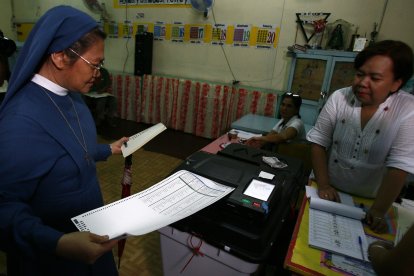DOJ charges Smartmatic founder Alejandro Piñate Martínez with bribery scheme in 2016 Philipine presidential elections
The company assured that its two employees accused of improper payments to Philippine election officials were suspended until the case is resolved.

Philippine elections in 2013
Two employees of election systems company Smartmatic will face bribery charges, according to a Justice Department report. Among those indicted by a grand jury in Florida on Thursday is the company's president and co-founder, Venezuelan Roger Alejandro Piñate Martínez.
Piñate Martínez and American Jorge Miguel Vasquez allegedly paid at least $1 million in bribes to Juan Andres Donato Bautista, chairman of the Commission on Elections of the Philippines (Comelec). The third defendant is Elie Moreno, a dual Venezuelan-Israeli national.

Política
El gobernador Youngkin ordena que todos los votos en las elecciones presidenciales de Virginia se emitan en papel
Emmanuel Alejandro Rondón
The payments, allegedly made between 2015 and 2018, sought to ensure that Smartmatic was contracted to supply voting machines and other electoral services for the 2016 presidential and vice-presidential elections in the Philippines.
As explained by the DOJ, the conspirators allegedly inflated the price of voting machines in order to pay the bribes with the surplus, the transfer of which they then attempted to justify with fake loans and fraudulent contracts.
In addition, they also allegedly tried to launder the ill-gotten money through bank accounts in several countries in different continents, including in the United States, in the southern district of Florida, where they will be tried.
Smartmatic defends itself
"Regardless of the veracity of the allegations and while our accused employees remain innocent until proven guilty, we have placed both employees on leaves of absence, effective immediately," wrote from the company after learning of the accusation.
The company further noted that it had not been included in the lawsuit and that there were no suspicions of voter fraud either, to which they added, "Voters worldwide must be assured that the elections they participate in are conducted with the utmost integrity and transparency. These are the values that Smartmatic lives by."
Bautista also defended himself, writing in an account attributed to his name that he sensed that the charges had been "influenced" by Philippine officials. "The voting machine company won the contract before, during and after my tenure as chairman," he added, vowing to defend his innocence in court.
Smartmatic, according to its own records, worked in the Philippines five times: in the 2010 general election, "the country’s first nationwide automated elections," the 2016 and 2022 elections, plus the 2013 and 2019 midterms.
RECOMMENDATION





















